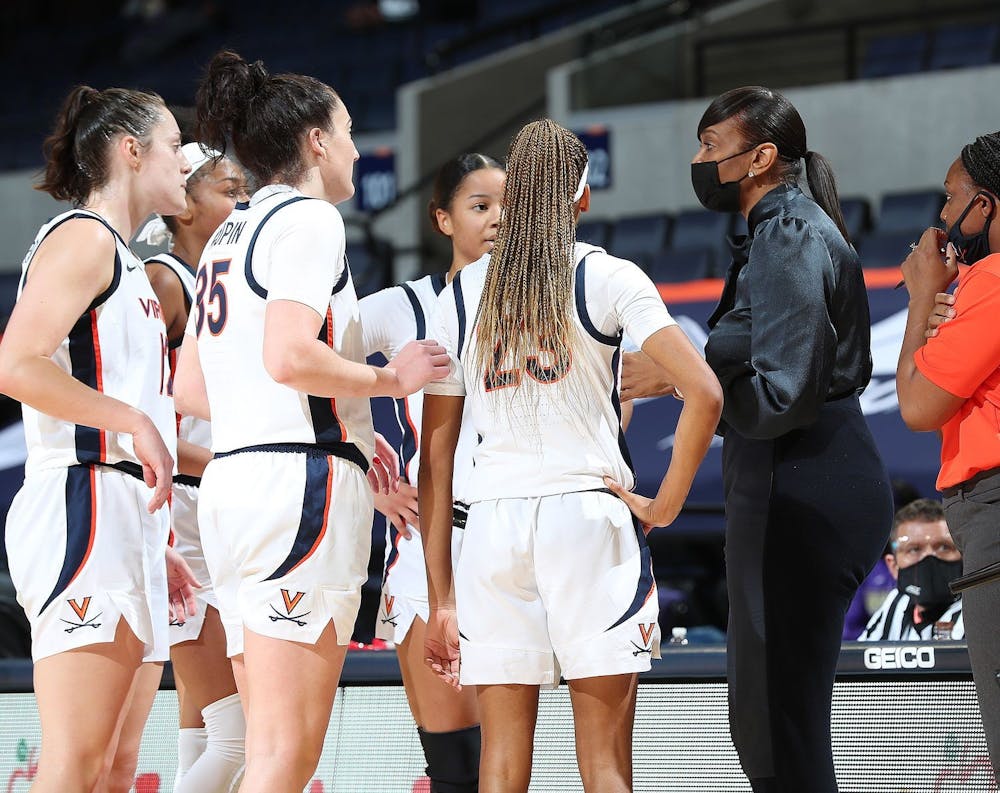The Virginia women’s basketball team has decided to not complete the remainder of the 2020-21 season, Virginia Athletics announced today. Virginia made the decision due to health and safety concerns within the program related to both COVID-19 and injuries.
“The decision was made with the overall health and safety of the student-athletes and staff in mind after the program postponed or canceled six games due to COVID protocols,” the press release said. “Injuries have also left the Cavaliers with a depleted roster impacting the ability to safely practice and compete.”
Due to the cancellation, Virginia will finish the 2020-21 season winless with five losses — including two to ACC opponents. Virginia was originally slated to play 24 games during the regular season, including four non-conference matchups and 20 ACC games.
Since the beginning of the season, Virginia has struggled to maintain a healthy roster. In the program’s first two games of the season — against Central Florida and East Carolina — nine Cavaliers played. Against James Madison Dec. 3, that number fell to eight players. Finally, for the last two games of the season and as the Cavaliers began conference play, just seven Virginia players contributed minutes.
Virginia has 13 players listed on the official 2020-21 roster. However, a number of these players have not been available for extended periods of time. Earlier this season, Virginia announced that two forwards — freshman Nycerra Minnis and graduate student Tihana Stojsavljevic — had suffered season-ending leg injuries while sophomore guard Dylan Horton had opted out of the remainder of the season. Several other players — junior forward Dani Lawson, sophomore forward Meg Jefferson and freshman forward Deja Bristol — were also dealing with injuries. Furthermore, sophomore forward London Clarkson was only recently granted eligibility to play.
To put things in perspective, for the majority of Virginia’s games last season, at least nine players earned playing time, and oftentimes 10 or more would be available for the team.
Eventually, Virginia’s health issues began to impact its schedule. The first game to be disrupted was Virginia’s meeting with George Washington University Dec. 6. The game was canceled after injuries limited the Cavaliers to having just six players available to compete.
Virginia played just two more games after the cancellation before suffering a string of postponements due to issues related to COVID-19 within its program — such as positive tests and subsequent contact tracing. After Virginia’s loss to Florida State Dec. 13 — which ended up being the Cavaliers’ last game of the season — six straight games were postponed, including matchups with Virginia Tech, Louisville, Syracuse, Wake Forest, NC State and Georgia Tech.
For this entire duration of time — a period of over a month — Virginia remained in “COVID protocols” and adhered to the standards outlined by the ACC COVID-19 Medical Advisory Group, which included testing three times a week for all women’s basketball players, coaches and staff.
Given the Cavaliers’ depleted roster and health challenges, Virginia concluded that the team could not complete its schedule safely and that canceling the season would be the best course of action for its student-athletes and staff.
“We have the pleasure of coaching a very resilient group of young women who have fought through injuries, a strict COVID-19 protocol and all the mental battles that come with it,” Coach Tina Thompson said. “So, the decision to end our season mid-stream comes with great difficulty. As difficult as it is to end our season in this manner, it is a necessary one. The health and safety of our student-athletes will always be the number one priority. We will continue to focus on their overall well-being and prepare to resume competition in the fall.”
In addition to off-the-court issues, the Cavaliers struggled on the court as they lost all five of their games by an average margin of 13.4 points. While roster depletion likely had a negative impact, Virginia’s lack of experience and proven talent was also apparent. Notably, 10 of 13 women’s basketball players are either freshmen or sophomores and the program lost four of its top five athletes — in terms of minutes played — from the previous season.
That being said, the team did have several bright spots including a quartet of young standouts — Jefferson, freshman guard Kaydan Lawson, and sophomore guards Carole Miller and Amandine Toi. Virginia will hope to build on this foundation when it restarts competition next season.
As Virginia women’s basketball halts its season, other winter sports at Virginia are continuing with their own seasons. While the men’s basketball team has had COVID-19 issues too, including a temporary program shutdown, the team’s schedule remains intact with its next game scheduled for Saturday. Additionally, several winter teams are just beginning 2021 competition. Wrestling started its season earlier this month and five more teams — swimming and diving, indoor track and field, men’s and women’s tennis and men’s golf are scheduled to start this weekend. The women’s golf team will kick off its season later this month. As of now, every other Virginia team in-competition will maintain its current schedule barring additional setbacks.
This article has been updated to include additional information about the status of several women’s basketball players prior to the season cancellation.







